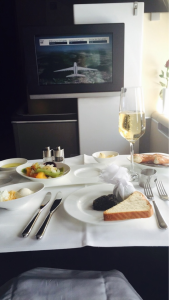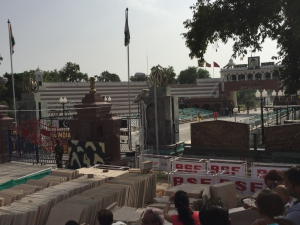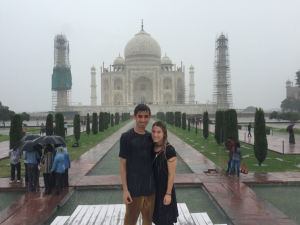
Anybody who has been playing the travel rewards game for more than a few months knows there are a few basic prerequisites for success:
- Good credit score
- Steady cash flow
- Disciplined financial management to pay off monthly debt
So how did a 20-year-old sophomore with no credit cards and no job earn enough points to fly first class to Delhi, India?
Ethan Steinberg’s journey to travel rewards guru began when he moved from Washington DC to Chicago for college in 2014. Knowing he didn’t have the money to fund regular flights home to see his girlfriend, he started looking for ways to earn Southwest Airline’s Rapid Rewards points.
“I didn’t get any credit cards, I just used the shopping portal and took online surveys to rack up points,” Ethan said. “I found as many ways as I could to earn the 6-7,000 points needed to pay for a one way ticket to DCA, which was half my trip, and I’d pay cash for the flight home.”
After earning a half dozen of these free flights, Ethan’s girlfriend sent him an article profiling the founder of One Mile at a Time, a popular blog focusing on rewards travel.
“It was the first time I realized the real possibilities of this hobby. It really showed me how high I could set my own aspirations,” he said.
Ethan’s first step was to figure out how to implement the strategies he had learned. Which was a challenge. Not only did he not have any credit history, he also had no work history to speak of.
So he opened a Credit Sesame account and realized he was an authorized user on his parent’s credit card, effectively giving him 20 years of credit history and a score in the high 700’s.
His first credit application?
“Chase Sapphire Preferred, of course,” Ethan said laughing.
In the next four months, Ethan secured three more cards, relying on his parents (who were also authorized users) to help meet the minimum spend. For all his creative efforts, Ethan said he didn’t really have a plan for the points, he just knew he wanted to see more of the world than he’d seen so far.
He also learned about Travel Miles 101 and took the free course, finding “incredible value” in the Facebook forums where he found tales of travel rewards nirvana and the answers to every question he’d ever had.
Shortly after, Ethan’s girlfriend was accepted into a summer study program in India, and his points strategy quickly took shape.
THE FLIGHTS
Ethan evaluated many options for his 2-week trip to India, finally settling on a mix of point redemptions and cash purchases.
“I really wanted the opportunity to fly first class for at least part of the trip,” he said.

Breakfast in his first class cabin.
So Ethan secured a first class ticket on Lufthansa from Frankfurt to Delhi for 60,000 points (transferred from Chase Ultimate Rewards to United). Face value of the ticket was $6,679 for this 8.5 hour flight.
“Some people ask me why I bothered with first class given how many points it cost. For me, the ability to show up on the other side of the world without stress or jet lag or any other worries, that’s worth every single point I spent,” Ethan said.
He completed his departure flights with two discounted one way fares, Chicago to JFK and JFK to Frankfurt – combined the tickets came in under $400.
In-country, he bought a $50 one way ticket from Delhi to Mumbai. “If you’ve never flown through a monsoon before? Don’t.”
Good advice, Ethan.
For his return to the states, Ethan used a $500 voucher from American Airlines and $250 cash to score a coach seat from Mumbai back to Chicago.
“So I spent $600 out of pocket and 60,000 UR points for an experience that should have cost $7,750.”
THE INDIAN EXPERIENCE – LODGING AND CULTURE
Ethan stayed with his girlfriend the first week of his trip while they toured Delhi, so accommodation expense was exactly $0.
Their week in Mumbai was spent in an Airbnb for a staggering $100 (Note: get $35 off your first Airbnb stay using this link).
Ethan reported that the food he experienced across the country gave him a new appreciation for Indian cuisine.
“Indian food is incredibly delicious and they focus so much more on diversity of spices,” he said. “I love that I have a better understanding of Indian food than just garlic naan and chicken tikka masala now.”
Ethan and his girlfriend enjoyed remarkable experiences across the country, including a tour of the nearly deserted Taj Mahal, and a walk through the Golden Temple at Amritsar – the holiest site in the Sikh religion.
“You can’t imagine how friendly everyone was and how excited they were to explain to us the significance of what we were seeing.”

Wagah border ceremony.
But the most memorable event of the trip was the evening Ethan spent at the Wagah border crossing ceremony. For decades, this has been the only border crossing gate between India and Pakistan. Since 1959, the countries have come together at this border every day at sundown to perform a cross-cultural dance off.
“We watched a special forces unit from each country perform this aggressive war dance at each other, then lower the flags of each country, and close the gate,” Ethan said.
He said thousands of spectators gathered on each side of the border, an event that felt more like a soccer tournament than a military exercise between two less-than-friendly countries. Vendors and hawkers filled the border gate areas, enticing the crowds with their wares.
Once the gate closed, the soldiers on each side retreated. An act that might have felt anti-climactic if Ethan hadn’t known the significance of it.
“It’s the retreat that really matters. It symbolizes that these countries come to the brink of war every day, and then walk away in peace.”
For a young college student with this kind of travel experience under their belt, what did he take away from the trip and his newfound travel rewards habit?
“This level of freedom is absurd,” Ethan said. “It puts me in charge of where I want to go instead of where circumstances take me. Nowhere is off limits anymore.”
And he has a few words of wisdom for those still on the fence about pursuing travel rewards. Make a plan and get started.
“It’s so much easier to be motivated if you have a plan for your points. 20,000 miles doesn’t mean anything. But if that’s 1/3 of your next trip, it’s incredibly meaningful,” Ethan said.
“Lot’s of people freak out about making the absolutely best first decision when they start. But in this case, the perfect becomes the enemy of the good,” Ethan said. “I say, just make a decision and start planning.”

Visiting the Taj Mahal during a monsoon.
